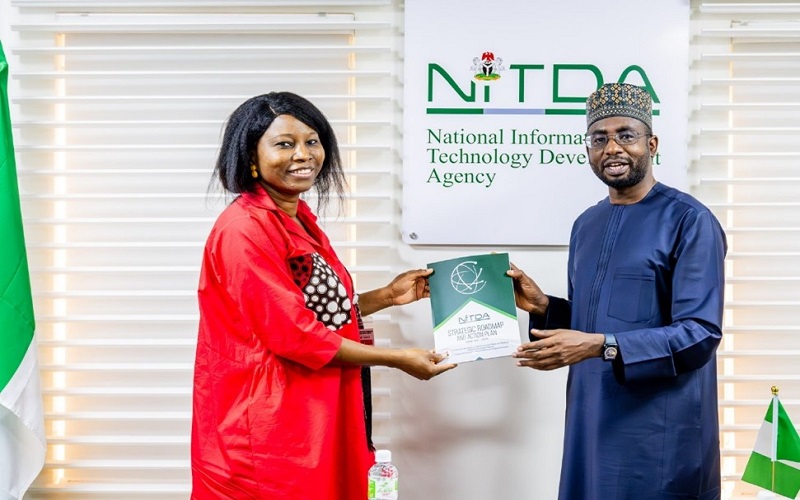In a bid to implement government policies aimed at digitally transforming the country and sustaining a vibrant digital economy, the National Information Technology Development Agency (NITDA) is poised to collaborate with the International Financial Corporation (IFC) by co-creating robust regulatory frameworks.
NITDA Director General, Kashifu Inuwa, disclosed this when he played host to a delegation from the IFC, led by the corporation’s Senior Economist, Dr. Nadege D. Yameogo, at the corporate headquarters of the agency in Abuja.
President Bola Ahmed Tinubu, according to Inuwa, has mandated the Ministry of Communications, Innovation, and Digital Economy to enhance productivity through technological innovation in diversifying the nation’s economy, stating that a strategic plan with 5 strategic pillars has been unveiled by the ministry to achieve this.
Enumerating the pillars as Knowledge, Policies, Infrastructure, Innovation, Entrepreneurship & Captial, and Trade, Inuwa noted that knowledge is the foundation upon which countries build a robust and sustainable economy and it was imperative to create an enabling environment where innovations and entrepreneurship ecosystem can thrive and be commercialised globally.
He reemphasised that “When we invest and we build the infrastructure, it will enable us to trade “made in Nigeria” products and services, as well as our greatest resource, which is our talent.”
The agency, he noted, is re-crafting its Strategic Roadmap & Action Plan (SRAP) policy document in implementing the Ministry’s strategic plan of accelerating the country’s collective prosperity through technical efficiency.
While expressing his enthusiasm at having the visitors on board for the agency’s stakeholder engagement on re-crafting the agency’s SRAP, Inuwa mentioned that the aim is to co-design the document so that the ecosystem could co-create the strategy and implement it.
Noting that the document would have 8 strategic pillars, he said that fostering Digital Literacy and cultivating talent would be the first pillar.
“We have the National Digital Literacy Framework (NDLF) where we have a target of achieving 95% digital literacy by 2030, and we have a midterm target of 70% by 2027.
“So, in the designing of this strategy, we want to get the stakeholders that will execute because we want it to be a strategy for execution”, he said.
The NITDA DG expressed his optimism that with the population of youths in the country if well harnessed and cultivated, Nigeria could compete with any country globally in terms of rendering services.
He said that the agency is willing to bring all stakeholders on board in providing inputs on how to design the strategy and identify some legal frameworks for the second pillar which is to ‘Strengthen Policy Implementation and Legal Frameworks.’
While emphasizing the need for the country to invest in deep research of technology, he stated that the third pillar is about Building a Robust Technology Research Ecosystem.
“Remember the mandate is to enhance productivity in critical sectors, so we see the digital economy beyond just being within the IT sector. It is pervasive so our goal is to apply it in different sectors to increase productivity,” he noted.
Earlier in her remark, Ms. Yameogo expressed her excitement at collaborating with NITDA in the promotion and sustenance of the country’s digital economy and stated that the priority area of interest is the digital economy.
Yameogo explained that digital infrastructure is an area that needs more attention, and maintained that it is an area where private investors can intervene in terms of Agri tech, Creative tech and Healthcare technology.

